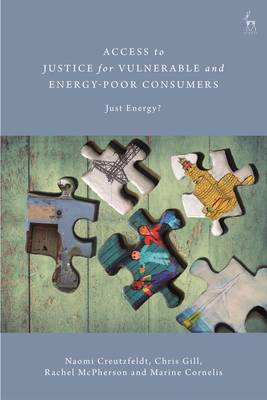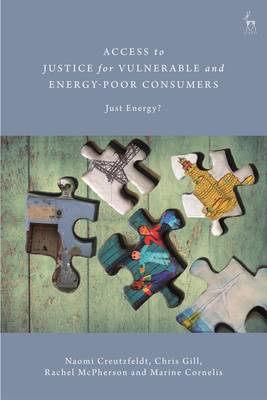
- Afhalen na 1 uur in een winkel met voorraad
- Gratis thuislevering in België vanaf € 30
- Ruim aanbod met 7 miljoen producten
- Afhalen na 1 uur in een winkel met voorraad
- Gratis thuislevering in België vanaf € 30
- Ruim aanbod met 7 miljoen producten
Zoeken
Access to Justice for Vulnerable and Energy-Poor Consumers
Just Energy?
Naomi Creutzfeldt, Chris Gill, Marine Cornelis
Hardcover | Engels
€ 220,45
+ 440 punten
Uitvoering
Omschrijving
How do ordinary people access justice? This book offers a novel socio-legal approach to access to justice, alternative dispute resolution, vulnerability and energy poverty. It poses an access to justice challenge and rethinks it through a lens that accommodates all affected people, especially those who are currently falling through the system. It raises broader questions about alternative dispute resolution, the need for reform to include more collective approaches, a stronger recognition of the needs of vulnerable people, and a stronger emphasis on delivering social justice. The authors use energy poverty as a site of vulnerability and examine the barriers to justice facing this excluded group.
The book assembles the findings of an interdisciplinary research project studying access to justice and its barriers in the UK, Italy, France, Bulgaria and Spain (Catalonia). In-depth interviews with regulators, ombuds, energy companies, third-sector organisations and vulnerable people provide a rich dataset through which to understand the phenomenon.
The book provides theoretical and empirical insights which shed new light on these issues and sets out new directions of inquiry for research, policy and practice. It will be of interest to researchers, students and policymakers working on access to justice, consumer vulnerability, energy poverty, and the complex intersection between these fields.
The book includes contributions by Cosmo Graham (UK), Sarah Supino and Benedetta Voltaggio (Italy), Marine Cornelis (France), Anais Varo and Enric Bartlett (Catalonia) and Teodora Peneva (Bulgaria).
The book assembles the findings of an interdisciplinary research project studying access to justice and its barriers in the UK, Italy, France, Bulgaria and Spain (Catalonia). In-depth interviews with regulators, ombuds, energy companies, third-sector organisations and vulnerable people provide a rich dataset through which to understand the phenomenon.
The book provides theoretical and empirical insights which shed new light on these issues and sets out new directions of inquiry for research, policy and practice. It will be of interest to researchers, students and policymakers working on access to justice, consumer vulnerability, energy poverty, and the complex intersection between these fields.
The book includes contributions by Cosmo Graham (UK), Sarah Supino and Benedetta Voltaggio (Italy), Marine Cornelis (France), Anais Varo and Enric Bartlett (Catalonia) and Teodora Peneva (Bulgaria).
Specificaties
Betrokkenen
- Auteur(s):
- Uitgeverij:
Inhoud
- Aantal bladzijden:
- 336
- Taal:
- Engels
Eigenschappen
- Productcode (EAN):
- 9781509939435
- Verschijningsdatum:
- 12/08/2021
- Uitvoering:
- Hardcover
- Formaat:
- Genaaid
- Afmetingen:
- 156 mm x 234 mm
- Gewicht:
- 644 g

Alleen bij Standaard Boekhandel
+ 440 punten op je klantenkaart van Standaard Boekhandel
Beoordelingen
We publiceren alleen reviews die voldoen aan de voorwaarden voor reviews. Bekijk onze voorwaarden voor reviews.








